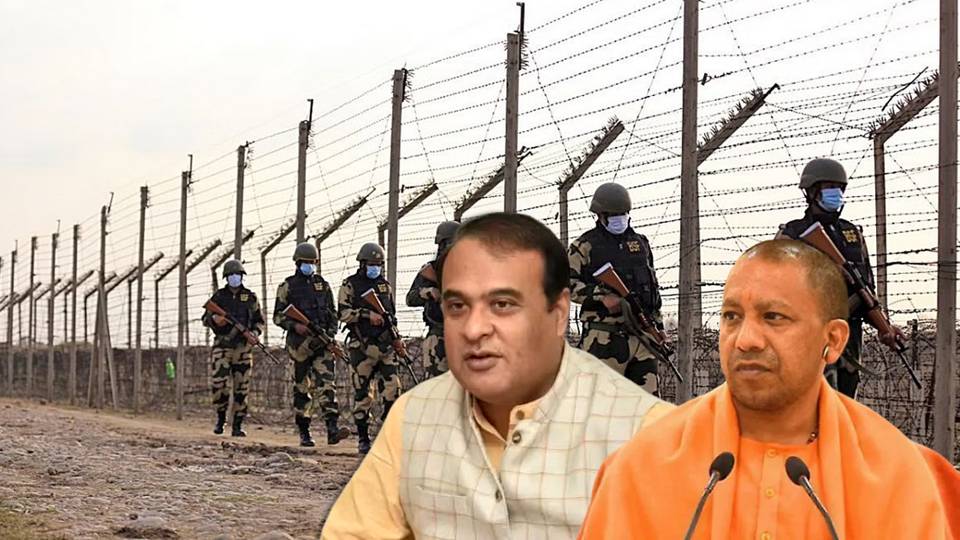South Asian countries are always criticised for not having porous borders like those of Europe and several other western countries. The on-ground reality is that demography-related violence is rampant in the region. This is the reason why agencies like BSF that handle the responsibility of Border protection, need to have more inspection radius.
Yogi and Himanta want more Border inspections
According to a report by Dainik Bhaskar, the Yogi and the Himanta governments have made formal requests for the increase in the reach of BSF patrol in their respective states. Both UP and Assam want the Force to have jurisdiction over the radius of 100 km inside Indian borders. Currently, BSF can only inspect suspicious activities within 50 km of Indian Territory. Even this power was only accorded to the BSF last year by the Modi government when it increased the radius from previous 15km to 50km.
According to State Police and Security agencies, the primary reason for the latest recommendation is the increase in Muslim population along the border areas. In areas along the border, the Muslim population has increased by 32 per cent since 2011. How much is it? Well, for the context, this is more than double compared to a 10 to 15 per cent increase in the whole of India.
Also read: PM Modi gave a free hand to BSF in Punjab. And BSF delivered immediately
Affected regions
Peelibheet, Khiri, Maharajaganj, Balrampur, and Behraich are the main districts of UP affected by the rapid increase. In over 116 villages, the Muslim population comprises more than 50 per cent of the whole. While in other 303 villages, they make up for 30 to 50 per cent of the population.
Expectedly, the number of Madarsas and Masjids has increased by 25 per cent in the last 4 years. In Assam, districts like Dhuvri, Karimganj, South Salamara, and Cachar are most affected by the phenomenon.
Legacy of partition
It is no secret that in 1947, the Indian subcontinent was divided on the basis of religion. However, against the expectations, the division did not bring in the desired result for both religious factions. On one end, Muslims were subjected to genocide by their own community members in East Pakistan and many other places. While on the other hand, Islamists kept trying to bleed India with a thousand cuts.
For the purpose, the Pakistani state and its supportive terrorist organizations have been funding radicalism in India. To get Indians on their side, they cite global Islamic brotherhood and try to entice them to participate in Jihad. Incentives include a bit more money compared to their current earnings and of course a pious trip to Jannat as well.
Also read: Punjab Government passes a resolution against BSF to support their Khalistani friends
The government has tightened its noose around radicalism
These fundings are mainly targeted towards Madarsas’ and Masjids’ bank accounts. These are the places where the poor Indian Muslims take their philosophical, moral, and spiritual lessons. In the name of religious teachings, these institutions have often been found teaching poor Indian Muslims that India is not the state that they should give their allegiance to.
Over the year, various governments have taken steps to improve the scenario. For instance, in May this year, Yogi Adityanath’s government made it mandatory for Madrasas to sing national anthem. Earlier in 2018, the MP government had asked Madrasas to hold Tiranga rallies and send video evidence to state officials. This came after the UP government passed similar orders a year before.
The problem has just been located to a different territory
The increased surveillance is probably the reason why more and more people began infiltrating the border areas. Most like they are the illegal aliens who made their way into Indian Territory by either bribing local officials or through land-Jihad. In Assam, it is also a possibility that people who were caught red-handed by the National Register of Citizens Act decided to internally migrate and settle in those areas.
Also read: Modi Government reverses land Jihad in Jammu & Kashmir with style
Whatever be the reason, the risk of radicalisation is always there. Because most of these people are not economically sound, they can easily be lured into engaging in some anti-national activities by radicals operation both inside as well as across the borders.
Unfortunately, the state police are not capable of eliminating these elements on their own. Moreover, the assimilation of these people among commoners is another hurdle that state police have to deal with. BSF also faces these hurdles but to a lesser extent.
Support TFI:
Support us to strengthen the ‘Right’ ideology of cultural nationalism by purchasing the best quality garments from TFI-STORE.COM
